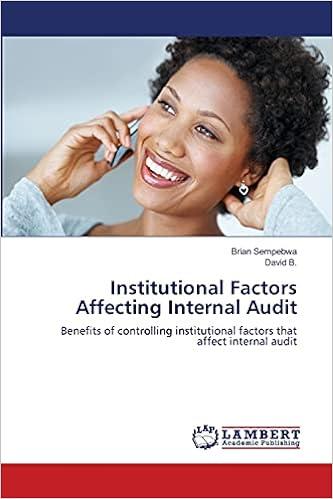Question
On January 1 st of year 1, Bob and Carol formed an S-corporation. They are equal 50/50 shareholders, each having contributed $5,000 in exchange for
On January 1st of year 1, Bob and Carol formed an S-corporation. They are equal 50/50 shareholders, each having contributed $5,000 in exchange for their stock. Carol loaned the corporation an additional $5,000 on June 30th of year 1 (all appropriate legal steps had been taken to ensure the loan is bona fide). The corporation had an ordinary loss in its first year of $12,000 and ordinary income in its second year of $15,000. Assume that all parties use a calendar based taxable year and that neither the passive nor at-risk limitations are applicable. If the S-corporation also made a $12,000 distribution on Oct 30th of year 1 (split equally between the shareholders as generally required by the one-class of stock rule), then what are the tax impacts of the distribution?
| A. | Both shareholders recognize a short-term capital gain of $1,000 on the distribution and each of their bases in the S-corporations stock is reduced to $0. Bob may not deduct any of the first year loss while Carol may deduct $5,000 of it. | |
| B. | Bob recognizes a short-term capital gain of $1,000 on the distribution, his basis in stock is reduced to $0, and he cannot recognize any of the first year loss. Carol recognizes no gain on the distribution, which reduces her basis in stock to $0 and her basis in debt to $4,000. Carol may then deduct $4,000 of the first year loss, which reduces her debt basis to $0. | |
| C. | Bob recognizes $5,000 of the first year loss, which reduces his basis to $0. Bob then recognizes a $6,000 short-term capital gain on the distribution. Carol recognizes $6,000 of the first year loss, which reduces her stock basis to $0 and her debt basis to $4,000. She then recognizes a $2,000 capital gain on the distribution in excess of her debt basis. | |
| D. | Bob recognizes $5,000 of the first year loss, which reduces his basis to $0. Bob then recognizes a $6,000 short-term capital gain on the distribution. Carol recognizes $6,000 of the first year loss, which reduces her stock basis to $0 and her debt basis to $4,000. She then recognizes a $6,000 capital gain on the distribution, because debt basis cannot be reduced for distributions with respect to the stock of the S-corporation. |
Step by Step Solution
There are 3 Steps involved in it
Step: 1

Get Instant Access to Expert-Tailored Solutions
See step-by-step solutions with expert insights and AI powered tools for academic success
Step: 2

Step: 3

Ace Your Homework with AI
Get the answers you need in no time with our AI-driven, step-by-step assistance
Get Started


